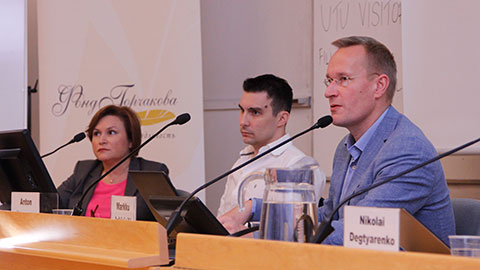People-to-People Policies Could Promote Co-operation in the Baltic Sea Region
Relations in cross-border regions, prospects for co-operation, economic ties, and the role of media in the Baltic Sea Region were topics of the Baltic Dialogue 2015 seminar in Turku on 4–5 November. The seminar brought together Russian and Finnish experts and students of political science and international relations.

Daria Akhutina from the Association for co-operation with Baltic Sea countries "NORDEN", Anton Romanov from the Baltic Sea Region Association and Professor Markku Jokisipilä debated economic and political ties in the Baltic Dialogue 2015 seminar.
The purpose of the Baltic Dialogue 2015 seminar was to discuss co-operation between the Baltic Sea Region countries as well as political and economic issues.
As the global geopolitical situation has changed dramatically in the last 25 years, the situation in the Baltic Sea Region has followed suit. The current situation of economic recession and political instability highlights the importance of continuous dialogue, public diplomacy and initiatives involving partners across borders despite occasional differences in values.
– We have to be tolerant and careful when formulating value-based policies and avoid Eurocentrism. Differences do not correspond to hostility, emphasised Tatiana Jurieva, Associate Professor from Moscow State Institute of International Relations.
According to Jurieva, the globalised world is a place of battle where different economic and ideological models compete. Countries such as Russia cannot operate on unilateral foreign policies.
Professor Markku Jokisipilä, Head of the Centre of Parliamentary Studies at the University of Turku, acknowledges that the Baltic countries have to take Russian politics into consideration. Russia has also been a key factor in creating markets for Finland.
– One of the biggest challenges for Finland is how to take care of our bilateral relations with Russia and at the same time be in line with the EU and its foreign policies, stated Professor Jokisipilä.
People-to-people policies could be one way to overcome tensions in the region. To promote future co-operation, a dialogue must exist also between non-governmental organisations and governmental structures.
In addition, environmentally sustainable technological innovations may be one way out of the current economic situation in the future. However, often these innovations face declining support from governments.
Even though the relatively small market areas, economic instability, sanctions against Russia and the differences in values pose challenges for successful co-operation, the strength of the region lies in its long history of collaboration and creative and innovative economies.
The Baltic Dialogue 2015 was organised by The Gorchakov Fund, Association for co-operation with Baltic Sea countries “NORDEN”, Finland-Russia Society and the City of Turku. The University of Turku hosted the event. The aim of the seminar was to form a solid basis for building bridges between people and scholars of the Baltic Sea Region.
Lassi Yli-Muilu
Roll-up image:Pixabay